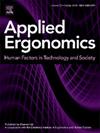When automation fails - Investigating cognitive stability and flexibility in a multitasking scenario
IF 3.1
2区 工程技术
Q2 ENGINEERING, INDUSTRIAL
引用次数: 0
Abstract
Managing multiple tasks simultaneously often results in performance decrements due to limited cognitive resources. Task prioritization, requiring effective cognitive control, is a strategy to mitigate these effects and is influenced by the stability-flexibility dilemma. While previous studies have investigated the stability-flexibility dilemma in fully manual multitasking environments, this study explores how cognitive control modes interact with automation reliability. While no significant interaction between control mode and automation reliability was observed in single multitasking performance, our findings demonstrate that overall task performance benefits from a flexible cognitive control mode when automation is reliable. However, when automation is unreliable, a stable cognitive control mode improves manual takeover performance, though this comes at the expense of secondary task performance. Furthermore, cognitive control modes and automation reliability independently affect various eye-tracking metrics and mental workload. These findings underscore the need to integrate cognitive control and automation reliability into adaptive assistance systems, particularly during the perceive stage, to enhance safety in human-machine systems.
当自动化失败时——研究多任务场景中的认知稳定性和灵活性。
由于认知资源有限,同时管理多个任务往往会导致性能下降。任务优先级需要有效的认知控制,是一种缓解这些影响的策略,并受到稳定性-灵活性困境的影响。虽然以往的研究已经探讨了全手动多任务环境下的稳定性-灵活性困境,但本研究探讨了认知控制模式如何与自动化可靠性相互作用。虽然控制模式和自动化可靠性之间没有显著的交互作用,但我们的研究结果表明,当自动化是可靠的时,灵活的认知控制模式有利于整体任务绩效。然而,当自动化不可靠时,稳定的认知控制模式可以提高手动接管性能,尽管这是以牺牲次要任务性能为代价的。此外,认知控制模式和自动化可靠性分别影响眼动追踪指标和心理负荷。这些发现强调需要将认知控制和自动化可靠性整合到自适应辅助系统中,特别是在感知阶段,以提高人机系统的安全性。
本文章由计算机程序翻译,如有差异,请以英文原文为准。
求助全文
约1分钟内获得全文
求助全文
来源期刊

Applied Ergonomics
工程技术-工程:工业
CiteScore
7.50
自引率
9.40%
发文量
248
审稿时长
53 days
期刊介绍:
Applied Ergonomics is aimed at ergonomists and all those interested in applying ergonomics/human factors in the design, planning and management of technical and social systems at work or leisure. Readership is truly international with subscribers in over 50 countries. Professionals for whom Applied Ergonomics is of interest include: ergonomists, designers, industrial engineers, health and safety specialists, systems engineers, design engineers, organizational psychologists, occupational health specialists and human-computer interaction specialists.
 求助内容:
求助内容: 应助结果提醒方式:
应助结果提醒方式:


